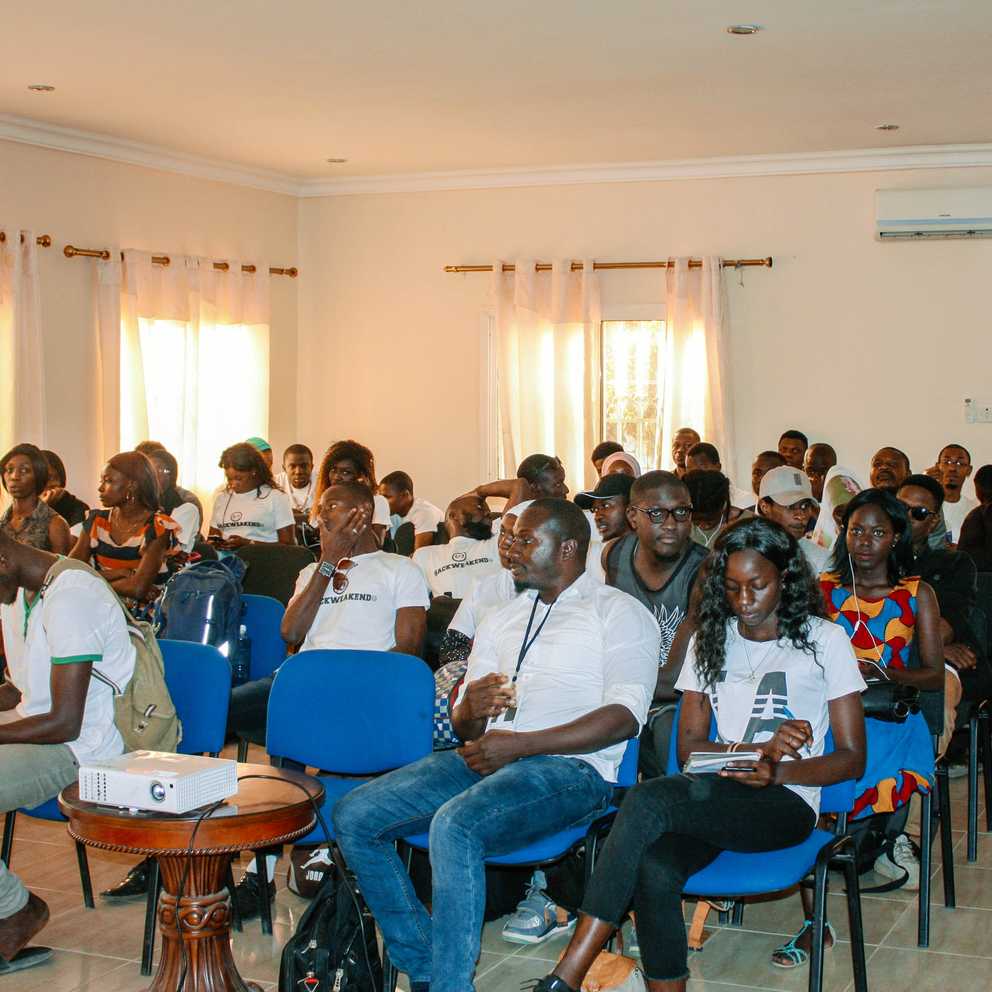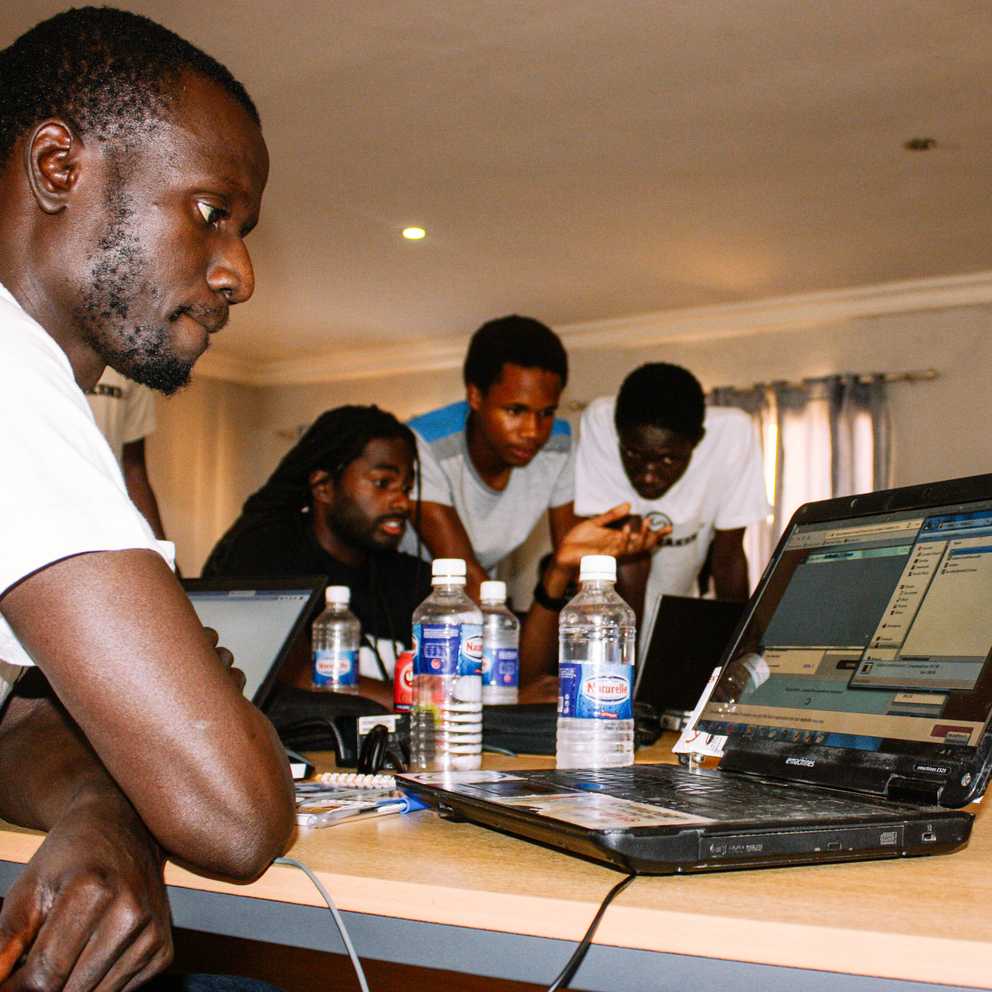What We Learned Co-organizing our 1st Hackathon and Programming Bootcamp in The Gambia
About a month ago we contributed to our first hackathon and bootcamp ever in the form of sponsorships and teaching engagements. The hackathon and bootcamp took place in The Gambia and a month after returning back to our work in Berlin, we've had some time to reflect on our experiences there and determine how to do improve any future involvements abroad.
After being introduced to Olawale Fabiyi while in The Gambia for holidays, I learned about the efforts of Hackweakend or Hack The Weak End which involved organizing hackathons to stimulate local talent and explore how technology can be utilized to tackle socio-economic challenges in the region — a mission we could rally behind.
Hack The Weak End is a pun that plays on tackling the "weak ends", the socioeconomic challenges that the region grapples with, by hacking together solutions over the course of a weekend.
It took numerous e-mail exchanges and calls before we were ready to board our flight to The Gambia, about a month ago, to deliver the remaining parts of our contribution to the effort. After a short weekend of intense collaboration we returned back towards Europe, elated about the exchanges that we have had and certain about continuing to dedicate a portion of our profits towards similar efforts.
The nation has been developing since the recent political change (a regime change occurred in 2017 after an election) which presents a fertile environment for upcoming talent and new business opportunities. We have met with some of such promising talents who are exploring how to introduce innovations in agriculture, education, finance, healthcare and a number of different sectors and found the potential and motivation of the local entrepreneurs encouraging.
The experience left us with some insights that will apply to bootcamps, hackathons and social-impact efforts wherever in the world they may occur. Some of these seem quite obvious, but this would not be first time that seemingly obvious points get overlooked and therefore they are mentioned anyways as notes to our future selfs.
General Tips
Our learnings boil down to the following points and will be discussed in more detail further in the article:
- Control event aspects (as an organizer) such that you have a better sense of what to expect. If you're trusting a sponsor to "own" certain aspects ensure that you are clear about what you require from them.
- Agree on sponsor commitments (on paper) such that you don't end up having to scramble for resources last minute.
- Safeguard the spirit of the hackathon such that hackers are motivated to return.
Control event aspects (as an organizer)
Some of the aspects to consider in relative order of importance are:
- location — optimise for accessibility
- internet services — optimise for bandwidth and WiFi coverage
- food and beverages — ask attendees for dietary requirements to nail this
- prizes — provide suggestions for suitable prices
- first-aid services — require certified individuals, if possible
- security services — require experienced individuals
- cleaning services — plan for availability during the event
- media services — involve photographers, videographers, influencers, etc.
As an organizer, it becomes increasingly difficult to appropriately safeguard the quality of all aspects of an event if the responsibility of these aspects is handed over to a sponsor. In order for an organizer to handle these aspects itself, it would need access to funds and should therefore optimize for securing funds from its sponsors rather than handing off those aspects to the sponsors to be handled as they see fit.
Communicate expenditures with sponsors if that helps establish trust to allow for the organizer to handle all purchases. Be prepared to provide sponsors with quotes and eventually invoices for the costs that they are sponsoring or an excerpt of the accounting upon request.
If one has to leave something to a sponsor, communicate often and clearly to avoid mismatches between that which is delivered to that which the event requires. Ideally, the organizer places the orders and forwards invoices to the sponsor.
Sourcing funds from sponsors is much easier if an effort has a clear legal structure and is able to forward invoices from its suppliers or perhaps issue its own invoices in a manner that is compatible with the accounting constraints of the sponsor.
As a sponsor ourselves, we considered that wiring funds would have been an easier way to be involved. Delegating a task to a sponsor is sensible if that task lies within the core focus of that sponsor. In our case, sourcing prizes, engaging in correspondence regarding those prizes and handling the logistic housekeeping to get those prizes to their destination were all aspects that diverted from our focus as a consulting and engineering firm.
Agree on sponsor commitments (on paper)
While following the progress of the organizers, we learned about the challenges in getting parties to commit to contributions. Demanding concrete commitments kept local sponsors at bay. Conversely, on-boarding sponsors with ambiguous commitments resulted to situations where it was unclear what the effort could rely on from the involved sponsors. This subsequently ended up costing the organizers quite some effort as they ended up having to resolve last-minute commitment changes.
Clarifying commitments on paper provides the organizers peace-of-mind while providing sponsors clarity on what is expected of them.
In conversations with the organizer, we learned that things we perceived as "hesitance to commit" may be attributed to us interpreting situations against the backdrop of what we're familiar with. Cultural nuances are important to understand. One example of this is the directness as one may be used to in Germany which may not be the best tool in the similar capacity in collaborating with parties in other parts of the world. Nonetheless, one would argue that clarity on what one is up against present pleasant circumstances to work with.
Depending on where one finds oneself, sponsors may considered themselves more as benefactors rather than approaching a sponsorship opportunity as a transaction of goods and services in exchange for goodwill, hiring visibility or other marketable value. Learn how to sell the value of the sponsorship to the sponsor in order to get parties on board. If you have to make concessions in on-boarding local sponsors be clever and careful to adequately manage the risk you introduce with vague sponsorship commitments.
Safeguard the spirit of the hackathon
After the hackathon, we observed that some participants were rather unamused by the fact that some participants started on their submissions before the hackathon began. In order to motivate participants to return, it would be important to ensure that the rules of participation are clear and enforced. Again, here expectation management plays a central role.
Hackathon organizers need to keep the playground fair enough to motivate participants to return. For what is a hackathon if lacking of a motivated and vibrant hackers community?
Bootcamp or Workshop Tips
For bootcamps, workshops and seminars, I would consider the next points in future contributions:
- Provide off-line resources in order to minimize reliance on networks (which are inherently unreliable) and to allow participants to continue learning whenever they are at home where they may have less access to the internet.
- Communicate system requirements and prepare for legacy tools such that participants know what they're up against but you can still include those who have no way to fulfil all requirements.
- Allocate support staff to sufficiently accommodate participants and promote fast-learning participants to help their peers and thereby strengthen their command of the new information.
Provide off-line resources
Providing off-line learning resources will allow attendees to continue learning after the bootcamp or workshop.
Make sure to provide some tutorials and installers on pen drives such that all participants can copy this material to their local machines to be taken home for further learning.
Especially in developing regions of the world, one will need to keep in consideration that StackOverflow and Google are not always accessible due to differences in communications infrastructure. Try to anticipate that in such cases, programming language references and off-line installers will be helpful.
Communicate system requirements and prepare for legacy environments
The challenge with bootcamps or workshops is that one has to deal with different attendees showing up with different environments with different capabilities. In our case we prepared VirtualBox images to use during our sessions but quickly found that many attendees had computers that were so old that they wouldn't even support virtualization in the manner that was required.
Clearly communicating minimum system requirements will allow attendees to assess whether they will be able to partake. Depending on the nature of the workshop and the potential of exposing more people to the content, it may be worthwhile to still offer some support for those who show up with environments that do not fulfill the minimum entry requirements.
Eventually we ended up installing Python for Windows on a few computers on the spot. In some cases, we even had to retrieve 32-bit installers. This choice complicated the workshop as we had to deal with different environments that at times rendered different results, but our assessment of the impact in including more people rendered this exercise worthwhile.
Tips for our next workshops:
- Prepare VirtualBox images (that don't require the latest virtualization features) and communicate the specs of computers to be able to run those images
- Download Windows installers (32-bit and 64-bit) for the tools being used in order to accommodate those who can't run VirtualBox images
Allocate support staff
Hosting bootcamps or workshops with support staff allows one to cater to the audience much better. Especially when hosting workshops targeted at beginners, one should anticipate holding participants by the hand to make sense of the new tools and the new methods that they will have to learn and apply.
Teaching is demanding and learning takes effort and time. Hosting bootcamps with support staff allows for more individual support and appointing fast-moving participants to help their peers strengthens their knowledge while providing value to those who need the help.
Because of the involvement of Anthousa and Elward during the bootcamp, the entire experience became more pleasant for both myself and the participants as we had extra hands to support people in need of additional help. This additional help becomes extremely valuable when multiple participants are struggling with installers or other housekeeping-related tasks. Anthousa, also saw to it that I ingested enough food and liquids to keep going which was something I tended to forget in the excitement of covering all the material I had prepared.
Leverage fast-learning participants as teaching assistants to support peers who are in need of extra guidance. Those who help their peers end up strengthening their knowledge while those receiving the help enjoy access to a larger pool of people that are available for personal guidance.
Special thanks to Moussa and some of his peers who played an instrumental role on this front and had the additional benefit, as a local, of a greater mastery of cultural nuances and lingual paradigms to transfer information more effectively.
Conclusion
Our involvement in The Gambia was extremely educational and rewarding to us and we hope that it will contribute to the further stimulation of the ecosystem to explore the possibilities facilitated by technology.
Currently, we're already looking at future projects to get involved with and look forward to other firms getting involved in allocating parts of their profits to support similar efforts around the world because we all stand so much to gain and learn from each other.



